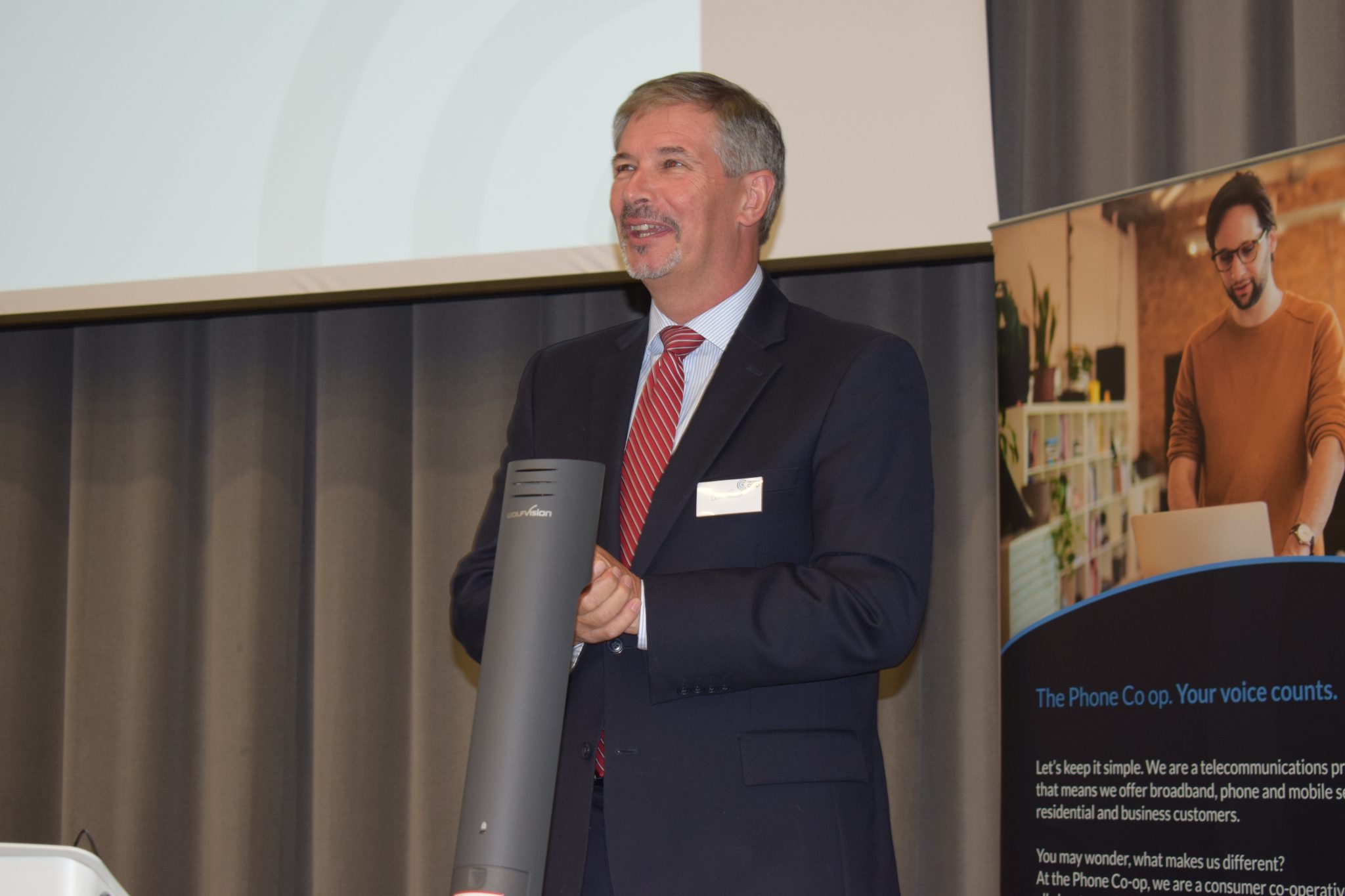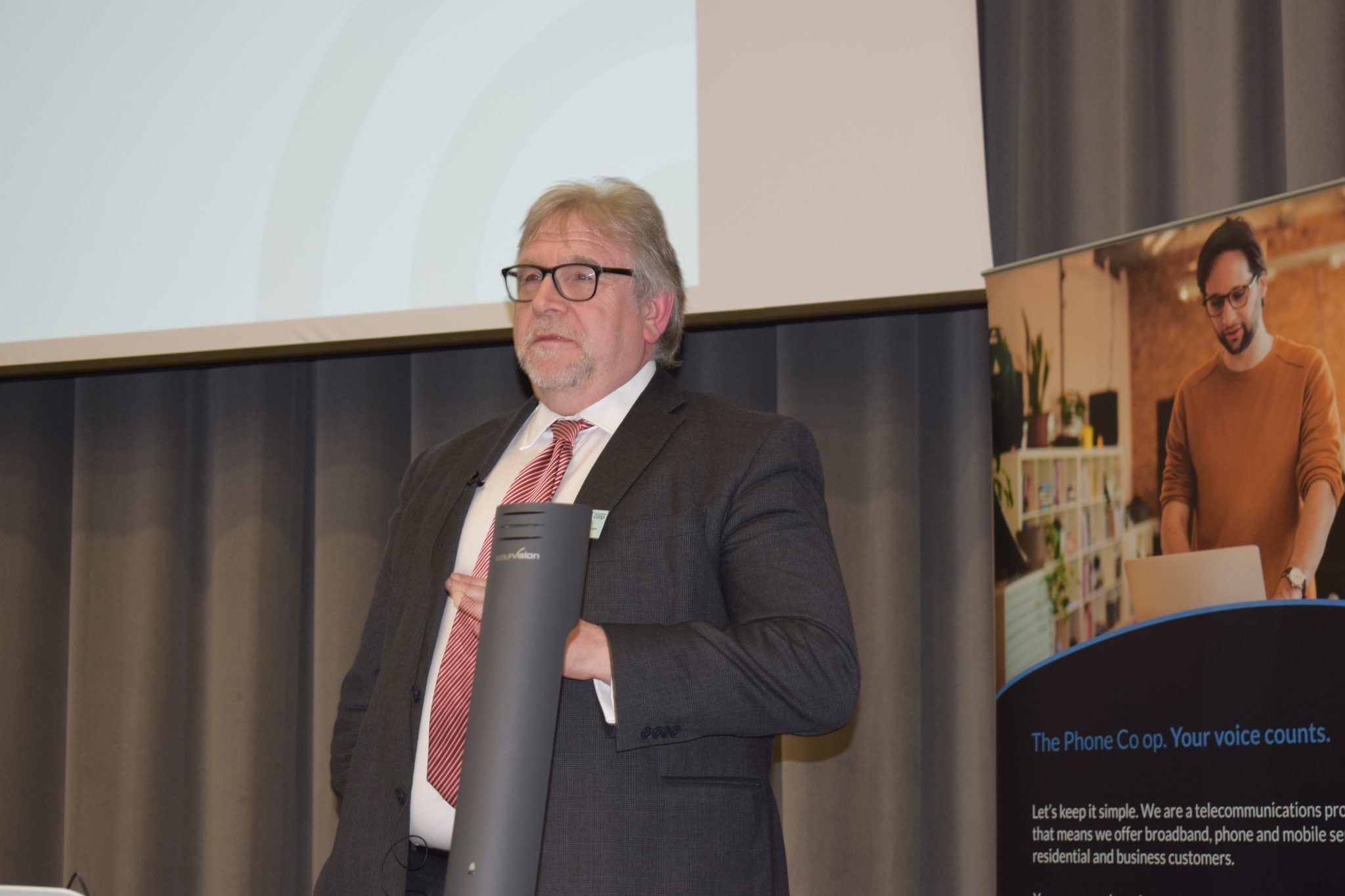A special meeting of the Phone Co-op has agreed a transfer of engagements to the Midcounties Co-operative by 202 votes to 17, with four abstentions.
That initial vote, held on 28 April, required confirmation at a second special general meeting in Droitwich on Saturday 12 May, where it was passed by 75 votes out of 76. Work is now afoot for the transfer, for 1 June, said a spokesperson.
Under the move, the Phone Co-op brand will continue, and staff will retain their terms of conditions of employment through a two-year transition. The organisation will continue to operate from its Chipping Norton and Manchester offices.
The merger will mean an end to the Phone Co-op as an entity with a distinct board.
Report from the special meeting of 28 April
Answering a member’s question at the 28 April meeting in Sheffield, chair Jane Watts said: “The Phone Co-op will cease, we will not be directors – there will a committee within Midcounties for the transitional period, and two of our directors will sit on it for continuity.”
Proposing the motion to members, Ms Watts said the Phone Co-op was working in an industry that was going through a huge transformation.
“We knew we were going to have to make some changes, but funnily enough this wasn’t one we were considering at all,” she said.
It was Midcounties, which is looking to grow its presence in the utilities market by developing telecoms alongside its Co-op Energy business, which made the approach, she told members, adding that this had prompted “a lot of soul-searching” among the Phone Co-op’s leadership.
This prompted Ms Watts’ team to consider the Phone Co-op’s main purpose: “To provide telecoms co-operatively to as many people as possible … we wanted to show there was a better way,” she added.
“We think Midcounties is a good fit and a good home for us.”
Related: Interview with Nick Thompson, CEO of the Phone Co-op
She said Midcounties could meet its ambitions in the telecoms market by building on the Phone Co-op’s work. There was an “alignment of values” between the societies, she told members, and the merger would help the Phone Co-op to extend its reach and offer better deals.
Ben Reid, group chief executive of Midcounties, also spoke in support of the motion, telling the meeting that the Phone Co-op had been an inspiration when his society set up its Co-op Energy business.
He said tighter data regulations against cross-selling between two organisations would have made it impossible for Midcounties to have acted merely as an agent for the Phone Co-op.

The rise of smart metering and water deregulation meant a changing landscape for utilities businesses, he added, and the merger would open up the possibility of a utility co-op that enters homes and “makes them into co-op homes”.
Furthermore, Midcounties could provide volume, with its 670,000 members and its Co-op Energy customers offering internal marketing opportunities.
The Phone Co-op’s Chipping Norton HQ needs refurbishment, Mr Reid said, but he insisted Midcounties was committed to the site. “My job will be to find a way of improving facilities for our colleagues. Don’t think we’re going to whip this thing over into Warwick, we’re just not.”
The Phone Co-op’s vice chair Shelagh Young said there had been concerns over the merger – over member involvement, customer service and staff terms and conditions – but that these had been addressed in discussion.
“Any change has areas of concern,” she added. “Bringing any two organisations together has potential negatives. We can’t say there are no risks but we feel that the negatives have been addressed.
“We will lose the old Phone Co-op to some extent, it won’t be the same, but that change is outweighed by the benefits.”
And Vivian Woodell, who founded the Phone Co-op, told the meeting: “There is a real logic in putting the two together. There are enormous cross-selling opportunities, which offer greater scale within a values-centred co-op. Other combined utilities providers such as Utility Warehouse have shown the model works. All the evidence is that customers who buy more products from the same supplier are less likely to leave.”
He warned that the alternative to a merger was “not very attractive”. The Phone Co-op’s new strategy has brought “a big rise in costs bringing significant losses,” he added, and if the board follows FCA guidance “this may well mean withdrawals of share capital could be suspended”.
“What is needed now is the rapid increase in scale and the synergies that a transfer to Midcounties can deliver,” he said.
This strategy was also put to the vote at the meeting and received a more mixed reception, with 136 votes for; 50 against; and 37 abstentions.
Related: Phone Co-op’s former chair raises concerns over strategy
Members were still concerned about the risks of the strategy, with former Phone Co-op chair Simon Blackley warning about the implications of committing Midcounties to underwriting it after a merger went through.
But speaking in support of the strategy, Phone Co-op chief executive Nick Thompson said the Phone Co-op had to prepare for a new stage in the digital revolution. BT is preparing to replace the UK’s copper-based network with an fibre-based one between 2020 and 2025, he said, which would render the telecoms systems used by many businesses obsolete.

The Phone Co-op had to be ready to take advantage of this, he told members, especially with its ambition to capture ethical customers in a mid-sized business-to-business market neglected by other telecoms players.
He warned: “We have a technology deficit. Our systems aren’t up to the mark. We didn’t invest. The scale of change has gone off the register and we haven’t been able to keep up.
“We have obsolescent systems, they literally creak at the seams – we chose not to make that investment. That’s what the board had to do when they decided on those increased costs.”
Pete Turnbull, an agent and former board member for the Phone Co-op, warned that the business strategy would require the Phone Co-op to sign up two business customers a week. “You say it isn’t that ambitious; I’d say that it is,” he said.
But Mr Thompson said the strategy would see ten sales staff added to the team over the five years of the strategy, building its momentum and selling power.
Amendment: This article has been updated to include the result of the second special meeting on 12 May.